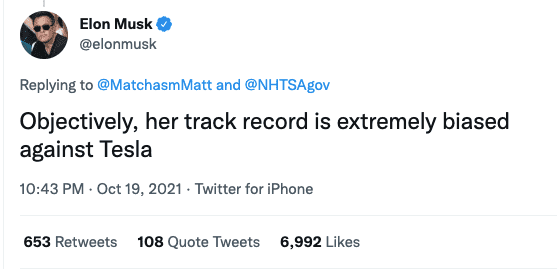It is not unusual for Tesla CEO Elon Musk to tweet 30 times a day. Twitter is his marketing platform, his customer service hub and, unfortunately for his opponents, his battleground. (And now, he is seeking to buy it.)
Last October, Musk used Twitter to target Missy Cummings, a Duke University professor and automation expert. “Objectively, her track record is extremely biased against Tesla,” he tweeted in response to one of his fans.
Those 9 words – just the latest in an ongoing disagreement between two outsized personalities in the booming field of automation – unleashed a fury.
Musk’s tweet mobilized an army of virtual trolls that attacked Cummings, who initially responded with grace. “Happy to sit down and talk with you anytime,” she tweeted back to Musk. This only enraged the trolls further, who smeared her online. And two days later, overwhelmed by the sheer amount of online harassment, Cummings deleted her Twitter account, stopped all public commentary and for the next few months largely went silent online.
This is the tale of that feud, which represents two distinct viewpoints about the technology behind the nation’s most popular electric car. The feud continues to simmer in different corners of social media, and will likely boil over in new ways in the future, especially if Musk succeeds with the Twitter takeover and his promise to make his favorite battlefield “broadly inclusive.”
This account is based on the tweets and public statements made by the many parties involved, a Change.org petition, LinkedIn posts by Cummings, and the syllabus she used for her Duke engineering course at the time of the tumult on Twitter. Cummings declined to comment to The 9th Street Journal. Neither Tesla nor Musk responded to requests.
‘Killer robots’
The online feud traces back to at least 2017 when Cummings, a widely known former Navy pilot who became a professor in Duke’s Pratt School of Engineering, began tweeting her concerns about Tesla’s highly automated cars, saying that they were “killing people,” among other criticisms.
Sometimes she was clinical, tweeting that Tesla’s autopilot technology gave drivers “mode confusion.” Other times she was blunt, saying that Tesla’s “killer robots” are so dangerous her students who tested them in the lab should “get hazardous duty pay.”
On occasion, she got personal toward Musk. Cummings went as far as posting a GIF of a woman knocking a man out of his chair with a single punch, suggesting she might do the same to Musk.
Cummings has since deleted and apologized for that tweet. “I was trying to make an admittedly bad joke that I would pull no punches if in a conversation with Elon Musk,” she posted in February. She clarified that she loves Tesla as a company and believes electric cars are the future, but feels obligated to voice the safety concerns she has with an automation system that is “terribly flawed.”
The apology apparently didn’t do much to mend her relationship with Musk or his fervent supporters.

When President Biden appointed Cummings to be a senior advisor for safety at the National Highway Traffic Safety Administration (NHTSA) on Oct. 19, Tesla supporters immediately took to Twitter to air their grievances, however profane and inappropriate.
Insults were hurled at Cummings calling her “anti-American,” a “tacky, petty woman,” an “obnoxious female” and a “b*tt hurt old woman.” One since-removed tweet responded to the news of Cummings’s appointment by saying: “If they try and take Autopilot (Tesla’s automated driving system) away from us we will riot so hard January 6 will look like a day at Disneyland.”
A handful of users voiced their support for Cummings online, saying, “Missy, I’m sorry this is happening. I support you!” or “thank you for your service Missy.” The Naturalistic Decision Making Association, an organization that helps clients navigate high-stakes decision-making, issued a statement acknowledging its support of Cummings. But these voices were far outnumbered.
Following her appointment, Cummings refrained from responding to the trolls. She was still directing research at Duke’s Humans and Autonomy Lab, which focuses on the interactions between humans and computers with autonomous features. (The lab’s acronym is HAL, a nod to the evil computer in one of Cummings’s favorite films, “2001: A Space Odyssey.”)
No stranger to stress
During the Twitter battle, she was teaching a class at Duke’s engineering school called The Human Element in Cyber Security, lecturing her undergraduate students about cybersecurity breaches. On the last page of her class syllabus, Cummings pasted a link to a list of Duke resources meant to help students who are experiencing “a range of issues that could pose a challenge to learning” including anxiety, stress and feeling down.
Cummings is no stranger to stress. Her interests put her in situations where she has to regularly contemplate life or death scenarios. She’s also no stranger to sexism, or to being challenged by powerful men.
In the Navy, men went out of their way to make Cummings’s life difficult. “I saw all the problems that come around with being one of a minority that’s trying to break into a majority,” she said in a podcast interview with Forward Thinking. One of her call names, nicknames given to aviators, was Medusa, a formidable woman in Greek mythology.
Cummings pivoted to a new career path. Her interest in preventing plane crashes led her to space systems engineering and eventually to Duke, where she focused on operator trust of autonomous systems and simulating unmanned robotic environments. The common thread: safety.
The trolls
Cummings has seen what can happen when there is miscommunication between human and machine. It’s what compels her to speak out against Tesla. Her main gripe is not with Musk, it’s with his refusal to incorporate a particular safety technology, LiDAR, into Tesla’s automation system.
LiDAR is a radar system that uses lasers to measure the distance between a sensor and surrounding objects. Cummings believes LiDAR is crucial for self-driving cars to accurately make sense of their surroundings. But Musk disagrees, calling the system “a fool’s errand.”
So, Cummings called him out.
The trolls responded right away. The day after her NHTSA appointment, one ventured beyond Twitter to create a petition on Change.org that called on the Biden administration to reconsider its appointment of Cummings to NHTSA due to “violation of agency guidelines and ethical principles concerning conflict of interest and bias.” It cited Cummings’s role on the board of directors at Veoneer, a Swedish automation company in competition with Tesla (she has since resigned); the unproven charge that she was a member of TSLAQ, an online collective of Tesla critics; and her public statements.
Written under the moniker “Autopilot Users for Progress,” the petition gained over 30,000 signatures in 48 hours before Change.org took it down due to “defamatory” content. The tweets however, continued to flood in, and on Oct. 21, Cummings deleted her Twitter account.
This measure, though drastic, did little to tame the trolls. They continue to harass Cummings on Twitter, even if she may never see it. Some found her personal email and began to send her threats privately. The emails prompted Cummings, who had declined to comment on the attacks, to break her silence.
‘In case anything happens to me’
Two months ago, on her LinkedIn page, Cummings posted screenshots of threatening messages she’s received “so that there is a traceable and public record in case anything happens to me.”
The use of words like “consequences” and “karma” in these messages are what scares Cummings, she said. “I am increasingly concerned about my personal safety around people who clearly are not capable of rational and reasoned thinking,” she posted.
One person suggested on LinkedIn that Cummings seek protection from the university, but Cummings responded “unfortunately Duke has not been supportive, they are afraid of controversy.”
Michael Schoenfeld, Duke’s vice president for public affairs and government relations, declined to comment on her critical LinkedIn post.
Cummings also wrote, “when women say they are afraid for their physical #safety, especially those of us who are public facing, they need to be believed.”
Photos at top: Missy Cummings – Duke University; Elon Musk – Wikimedia Commons






